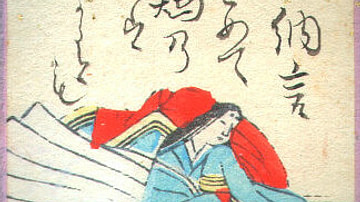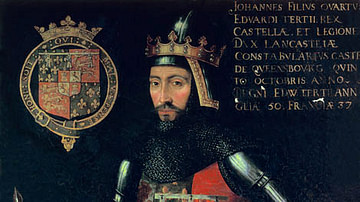Search
Search Results

Definition
The Pillow Book
The Pillow Book (Makura no Soshi) is a personalised account of life at the Japanese court by Sei Shonagon which she completed c. 1002 CE during the Heian Period. The book is full of humorous observations (okashi) written in the style of a...

Video
Ancient Egyptian papyrus in the Book of the Dead exhibition at the British Museum
Preparing pieces of papyrus ready for display in the exhibition Journey through the afterlife: ancient Egyptian Book of the Dead

Video
Judgement in the Presence of Osiris, Hunefer's Book of the Dead
More free lessons at: http://www.khanacademy.org/video?v=WceVwMdN0eE Hunefer's Judgement in the presence of Osiris, Book of the Dead, 19th Dynasty, New Kingdom, c. 1275 B.C.E., papyrus, Thebes, Egypt (British Museum). Erratum: near the end...

Definition
Book of the Heavenly Cow
The Book of the Heavenly Cow is an ancient Egyptian text dealing with the rebellion of humanity against the sun god Ra, his destruction of the rebels through the goddess Hathor, the reversal of this decision and Ra's mercy, and his ascent...

Definition
Book of Genesis
The Book of Genesis is the first book of the Jewish scriptures and the Old Testament of the Christian Bible. Genesis takes its name from the opening line in Hebrew – beresit, ("in the beginning") – later translated into Greek as genesis ("origin"...

Definition
Book of Job
The book of Job in the Hebrew Bible is found among the books designated Ketuvim ("writings"), along with Ecclesiastes and the Book of Proverbs. All three belong to a genre known as wisdom literature. The books share a common ancient cultural...

Article
Egyptian Gods - The Complete List
The gods and goddesses of Ancient Egypt were an integral part of the people's everyday lives for over 3,000 years. There were over 2,000 deities in the Egyptian pantheon, many whose names are well known - Isis, Osiris, Horus, Amun, Ra, Hathor...

Article
Chaucer's The Book of the Duchess Full Text & Summary
The Book of the Duchess is the first major work of the English poet Geoffrey Chaucer (l. c. 1343-1400 CE), best known for his masterpiece The Canterbury Tales, composed in the last twelve years of his life and left unfinished at his death...

Article
Grief & Consolation in Chaucer's Book of the Duchess
In Geoffrey Chaucer's first major work, The Book of the Duchess (c. 1370 CE), two genres of medieval literature are combined – the French poetic convention of courtly love and the high medieval dream vision – to create a poem of enduring...

Definition
Burial
Burial of the dead is the act of placing the corpse of a deceased person in a tomb constructed for that purpose or in a grave dug into the earth. Archaeological excavations have revealed Neanderthal graves dating back 130,000 years, marking...